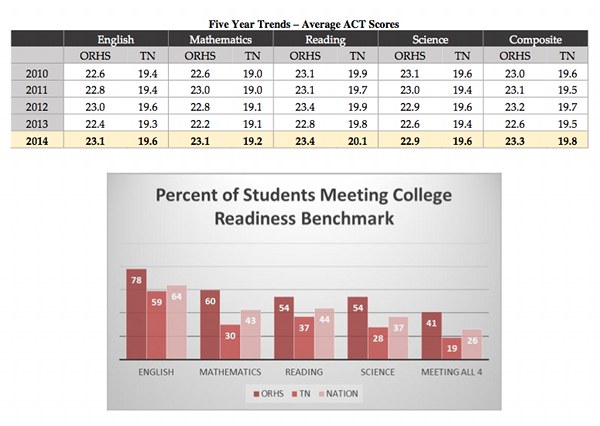Submitted
The ACT college entrance examination “assesses high school students’ general educational development and their ability to complete college-level work.” Students are tested in English, mathematics, reading, and science. They receive a score between one and 36 for each test and also a composite score, which averages the performance on all four subject tests.
The ACT is widely accepted as the premier college entrance examination.
Oak Ridge Schools Superintendent Bruce Borchers said: “In the Oak Ridge Schools, we believe it is crucial for our students to perform well on the ACT examination. It is one of our Seven Keys to College and Career Readiness, and we are proud of how students perform on the ACT and of our teachers who prepare them. This year is no exception.”
The 2014 Oak Ridge High Schools graduating class significantly outperformed the state and national averages on each of the subject components of the ACT examination as well as the overall composite. In fact, Oak Ridge’s 2014 graduating class achieved higher in English, mathematics, reading, and composite than any other ORHS graduating class in the past five years. In addition, the percent of ORHS’s 2014 graduates that met or exceeded all four of the ACT College Readiness Benchmark Scores was far higher than the state and nation.






Raj Jain says
Am I the only one seeing it differently or am I wrong in my understanding?
The Oak Ridge Today graph says that only 41% of students in Oak Ridge High School who took the ACT meet the college readiness benchmark in all four areas (English, Math, Reading, and Science? i.e. 59% need to try harder and take remedial courses in community college to get there.
41% is less than half the students who took the ACT in 2013-2014 school year are ready for college.
I don’t understand the social media fanfare by Marczak and company.
Andrew Howe says
Given the comparison to state and nation levels, 41% is quite good. Besides, it only makes sense that not all people would excel in all areas – because of the way the human brain works, one would expect excellence in all disciplines to be more the exception than the rule.
Therefore, to me this implies we have a more exceptionally well balance student body than most, which implies our teachers are going the extra distance to make sure the students have a good comprehension of the disciplines they may not have a natural affinity for.
But we’d need to see the five year trend of the “meeting all four” percentages to know if this is an anomaly year or directly attributable to our schools.
Raymond Charles Kircher says
I agree Andrew Howe, time will tell. Raj is lackluster with his math skills not seeing the 6% Gifted and Talented, 75% AP pass rate, and many more spikes in the track while the city is building a 21% poverty rate with some areas of our city well over 40% poverty rate, but Raj is still here spewing lies with his math. I could only wonder what his psychologist would write in his file. Raj, here is some math for you, A bus leaves Oak Ridge this weekend. How fast can you be packed and on it with a one way ticket?
David Allred says
No reason to take it personal with Raj, Raymond. Let’s just stick to being informative and/or discussing our takes on the issue.
Personally, I think the results are fairly impressive despite knowing full well that I have met a plethora of Oak Ridge students who scored in the low to mid 30’s on their ACT and still couldn’t think creatively, inductively, or with any sense of interdisciplinary skill. That’s the biggest problem with these tests imho — they don’t always measure what we think they do.
Still, I think we have a lot to be proud of in what was measured. Still work to do? Of course! That’s what makes life fun.
Raymond Charles Kircher says
Misinformation is neither personal or demeaning. It is an agenda. Whether the misinformation be due to ignorance or intentional direction, it is nothing more than that, It is when people like Raj who takes a piece of information and misinforms people of his viewpoint, that his philosophy to help ceases. What help is supportive from that post of his? I don’t see it. These scores in my research are top of the class. Let us work to keep these scores and rates and not work to decrease them by telling our administrators to not spread this news. I have a few names to call Raj, informed is not one of them. There are many different issues that can affect these tests. It all starts with the parents, not our administration. I have my dislikes, but I don’t misdirect them upon people.
David Allred says
Misinformation or not, I don’t think suggesting people leave town on a one-way ticket is appropriate etiquette for a message board.
As it stands, these are great scores in comparison to other districts – but what about Raj’s question? And I mean, generally speaking, as it relates to education? Regardless of where we stand compared to schools here or there, what does it say if fewer than half our students aren’t proficient in college readiness bookmarks across the board? Or worse, what does it say when only 1 in 5 our students in the state of Tennessee are ready for college across the board?
It’s like saying, “We’re failing half the time, but at least we are not as bad as those guys.”
I think it’s a fair question to ask, maybe not of our leadership in particular, but certainly we should be asking what is it about our national and state education strategies that so clearly miss a mark by such a huge amount. With all our “races to the top” and “no children left behind” and now our “core competencies,” we seem not to be taking much away from our own history of education intervention, but rather upping the ante with the same old high stakes testing.
Re-thinking poverty, un-wed parenting, divorce, and the impacts stemming from a whole host of social problems might cut deeper into our educational interventions than expecting our schools to raise a generation of children whose value is somehow determined on a scan sheet.
Raymond Charles Kircher says
Which question? Raj has two question marks in his post. Do you really believe you can half of the students ready for college? Which college? What degree? Raj can say to our administration to “shut-up”? Seems like you just want to attack like Raj has done. If it is about the question and not the poster, what were your ACT, SAT scores David Allred? I didn’t take the SAT, but have a composite score of 27 on my ACT. Went to college and still wasn’t ready. Can I have your benchmark on what is college ready?
johnhuotari says
Raymond,
I agree with David on this: I think we can have disagreements here without asking someone to leave town.
I don’t think David is attacking, as opposed to acknowledging what we can be proud of while also asking questions. I don’t think his personal ACT/SAT scores are relevant to this conversation. I think the last question you raised, a more general discussion about what is considered college-ready, is good.
Thank you,
John
Raymond Charles Kircher says
John,
And to tell someone to not spread good news, where does that lie on the discussion? Raj isn’t informed, he has not good will or a philosophy to help. Oh yeah, Raj is missing it. These administrators are ours, not his.
David Allred says
Raymond,
Apologies if I came off hostile in anyway. Not my intention. I am passionate about education, I guess because I worked in school administration for a while and I know how hard these folks work & how often times, it is the federal and state mandates that often keep them pushing paper rather than reaching students.
I spend my Friday evenings with a group of teachers & former administrators that I love and admire, definitely would never want to be perceived as going on the offensive against what they do every day.
I am more interested in educational theory & have a particular educational philosophy that is rooted in the ancient Greek structure of Mathematics, Logic, and Language (Oration).
I think we often forget that grades weren’t even given to students until about the 2nd World War. Many people living in town today can recall a time where students were simply given a Pass / Fail on subjects. Since the advent of grades, we moved to standardized testing and have with each generation gone deeper down that rabbit hole to the detriment of our society, at least in my opinion.
Back to the question though, I was merely asking if it’s ok for us to benchmark what we consider “success” by contrasting it to the failures of others… or if there might not be a better way to gage college readiness.
As to me personally, I always tested poorly and lacked the concentration to sit for three or four hours straight to take a high stake’s test. I spent the time watching spiders build webs in the corner of the window sill, or counting butterflies out in the school lawn. My scores were barely enough to get me into the college I wanted to go to. The irony though was that I was very much prepared for college because the curiosity hadn’t bee “skilled and drilled” out of my soul. Ended up graduating magna cum laude while holding down three jobs during college.
I have always wondered how that happened and don’t have any answers. I do very much enjoy a good question though. And your question on what constitutes being “college ready” is a good one. For me, it definitely wasn’t a test score.
Raymond Charles Kircher says
No harm done, David Allred, but what Raj is doing is harmful. The benchmark is per college, not per Raj. There is no curriculum that will cookie-cutter all high school students for post secondary institutions. Each institution has their expectations while no high school can meet all institutions. I see more than half of the secondary school students here can easily move into a college curriculum with little effort. High School is not meant to be a higher education institution for the whole. You break down the test above, you will see this school district is doing many students a service. We are currently teaching our son exponential expressions in division and multiplication, finishing polynomial equations, buying texts of anatomy and waiting for his decision on Faulkner, Steinbeck, Poe, or Shakespeare, but I believe he will take Roosevelt for a reading exercise. I am familiar with college entrance, and he has his heart set on underwater welding. What can I do but prepare him for what he wants, not what others expect from him. What this school district doesn’t get credit for is providing so many students a visible future in anything a school can provide. That I applaud them; this ACT ranking says as much.
Raymond Charles Kircher says
David Allred, these scores for ORHS will put almost half of our school in the top 25% of their class at UTK with an ACT composite of 24/29 at enrollment while almost 25% of ORHS students will be in the top 25% at enrollment in Vanderbilt with an ACT composite of 32/34. I find these numbers to represent what is available in our schools which is much more than you can find at many other schools anywhere, including internationally. I know many more people in this city really don’t care about these scores, but it is that score which put me within reach of many colleges. What gets to me is that people like Raj expect others to provide for his existence. That I won’t take at all. These scores come from students who wanted to do well. Raj does want to do well, so I have to ask him to leave. We remove these low-lights from our community, we will have much more high-lights by people who can and do help others to help their selves.